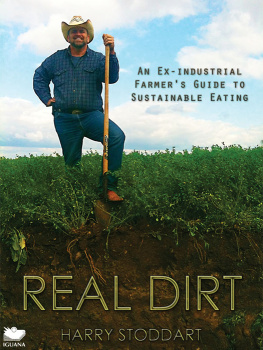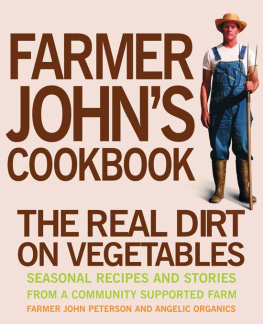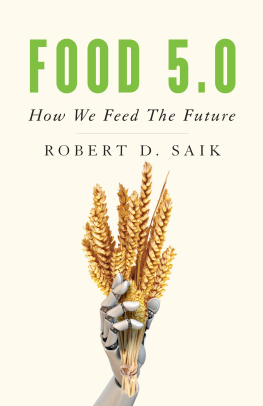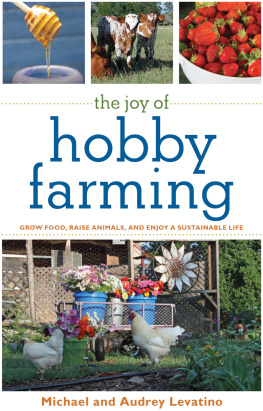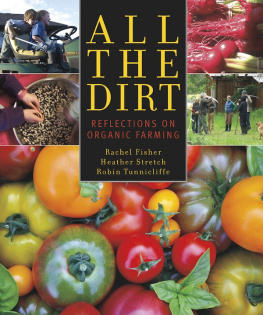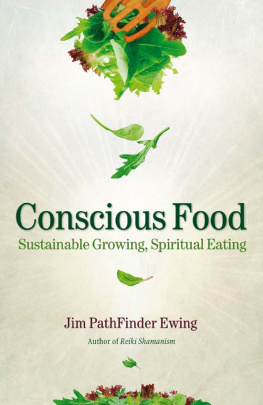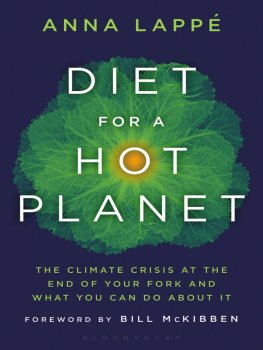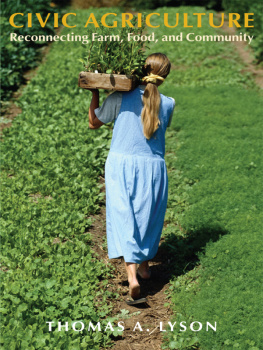

Copyright 2013 Harry Stoddart
Published by Iguana Books
720 Bathurst Street, Suite 303
Toronto, Ontario, Canada
M5V 2R4
All rights reserved. No part of this publication may be reproduced, stored in a retrieval system or transmitted, in any form or by any means, electronic, mechanical, recording or otherwise (except brief passages for purposes of review) without the prior permission of the author or a licence from The Canadian Copyright Licensing Agency (Access Copyright). For an Access Copyright licence, visit www.accesscopyright.ca or call toll free to 1-800-893-5777.
Publisher: Greg Ioannou
Editors: Christa Bedwin, Sheila Wawanash, Meghan Behse
Front cover image: Connor Stoddart
Front cover design: Lauren Ogilvie
Book layout design: Meghan Behse
Library and Archives Canada Cataloguing in Publication
Stoddart, Harry, 1969-, author
Real dirt : an ex-industrial farmer's guide to sustainable eating / Harry Stoddart.
Includes bibliographical references.
Issued in print and electronic formats.
ISBN 978-1-77180-011-2 (pbk.). --ISBN 978-1-77180-013-6 (epub). --ISBN 978-1-77180-014-3 (kindle). --ISBN 978-1-77180-012-9 (pdf)
1. Sustainable agriculture. 2. Natural foods. I. Title.
S494.5.S86S76 2013 630 C2013-905465-0
C2013-905466-9
This is an original electronic edition of Real Dirt.
REVIEWS
Harry told me this book would prod a few hornets nests; I had no idea just how extensive and thoroughly he had prodded! Concerned that the entire world needs a wake-up call, Harry Stoddart shares a most insightful look at agriculture and the resulting food that we all eat. Those three daily choices can be driven by our conscience or the almighty dollar. The law makers who govern food production and those who enforce them, together with those who educate this vital commodity, could all do a better job if they read Harrys book. Need we say any more. Read the book. You may be shocked but you wont be disappointed.
Elwood Quinn, La Ferme Quinn, Rare Breeds Canada.
Harry Stoddart has a wealth of professional, academic, and practical experience in agriculture, and the blend of that knowledge is skillfully demonstrated in Real Dirt. Stoddart recognizes that this book unearths sacred cows on both sides of the debate as to how agriculture can continue to be sustainable. The author advocates for rational dialogue to foster integration of these systems rather than following an either/or philosophy. This book could be the fuel for that discussion.
Dr. Frank Ingratta, Retired Deputy Minister of Agriculture, Food and Rural Affairs, Ontario
Real Dirt is a thoughtful and well-researched look at our agriculture and food system. It is brought to life with a unique, well-informed perspective and offers practical solutions that will make each of us think about our actions . Real Dirt is a must read for anyone who is actually interested in learning about and discussing how to improve our food system for the long term.
Rob Hannam, Owner, Synthesis Agri-Food Network
I dedicate this book to future generations,
with the hope that I got enough right to be classed as someone who did something to improve your world.
INTRODUCTION
When planning for a year, plant grain. When planning for a decade, plant trees.
When planning for life, train and educate people.
Ancient Chinese Proverb
Our border collie, Kasne, has figured out the difference between chickens and ducks. Our egg layers truly range free, and some of them enjoy coming around the house. Kasne is supposed to keep the hens off the porch, but he generally only does so when someone is looking. Hes figured out that it doesnt matter how many times you tell a chicken to get lost, theyre all cocky enough to come back. Ducks, on the other hand, are Kasnes favourite livestock.
Our paddling of laying ducks is Khaki Campbell. They are much more wary and much stronger flockers than chickens or any other animal we have. With sheep and cattle, there is a clear lead animal the alpha female followed closely by the alpha male if there is a threat. With ducks, there is no clear leader, but they move with the precision of an Olympic synchronized swimming team.
The Khakis fascinate Kasne. He will spend hours at the pond, watching and manipulating the movement of the ducks. Hell take a step to the left and they will all simultaneously swim to the right. He spent last winter subtly moving them around the yard and over snowdrifts. When spring came, the ice was slow to come out of the pond. For a couple of weeks, there was thin ice or open water around the edge and a piece of thick ice floating in the middle. The ducks learned that Kasne wouldnt follow them out onto the pond the cold ring of water around the outside stopped him in his tracks so the ducks would calmly sit in the sun and paddle in the puddles on the ice, safe in the knowledge that the dog wouldnt come out on it. As the spring progressed, the ice gradually melted until the pond was completely open.
One day, I was sitting in my office overlooking the pond with the windows open to the warm spring breeze. I heard a splash, followed by a lot of cursing and swearing from the ducks. Kasne had splashed into the pond and was swimming after them while they paddled and flapped their wings as fast as possible to get away. Apparently, it hadnt occurred to them that the dog could swim. In their relative experience, a dog had never ventured into the pond. There was no organized retreat; they all panicked and went off in every direction possible.
What Kasne and the ducks had discovered was the limits of their relative perspectives. But we all come at life with our own perspectives and biases. In fact, everything we experience, we experience relative to our knowledge and accumulated wisdom. Every time you eat, for example, you make a choice about the type of food you consume. Your choice is based on your relative experience and goals. And your choice signals the market to produce more of what you chose to eat. All of our choices, taken together, are determining which type of food system produces which types of food now and in the future. In essence, you are choosing the food that will be on your grandchildrens buffet. You are also choosing how that food should be produced on the farm. If you choose solely on the basis of price, you are ensuring that lower-cost food will be pursued regardless of the non-monetary costs to society (for example: erosion of land, phosphorus pollution of rivers and lakes, and greenhouse gas emissions). If you value more than just what is produced at what price, your choices need to reflect your other values. But what should we value to ensure that our grandchildren have healthy, abundant food?
This is a question that is not easily answered. Ive been farming for over two decades and I have trouble sorting through all the information and misinformation about food production. If our primary concern is preserving the ability to produce food abundantly for future generations, what choices should we be making in the present? Should we denounce genetically modified food? Should we choose organic? Should we become vegetarian? Should we be locavores? Are there factors beyond what we can read on labels? How do pesticides, fertilizers, and antibiotics fit into the equation?
Lets get one thing straight off the top there are no magic labels to guide you. If we want to sustain humanitys ability to harvest energy from the sun and turn it into protein and calories which is what agriculture is and does we need to look beyond our conventional systems, beyond organic, and beyond vegetarianism to a system of food production and consumption that is a closed loop. Nutrients, water, organic matter, and fuel are all making a one-way trip through our food system and being discarded. All of our current production and consumption systems have serious flaws. We need to reduce our inputs of energy, nutrients, and water, but we also need to design our systems so that the resources that
Next page
